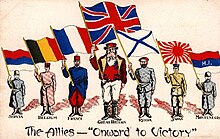
Back Nasiebou Afrikaans بناء الأمة Arabic Изграждане на нация Bulgarian Nationbuilding Danish Nationenbildung German Kreado de nacio Esperanto Construcción de nación Spanish Rahvusriigi rajamine Estonian ملتسازی Persian Édification de la nation French
Nation-building is constructing or structuring a national identity using the power of the state.[1][2] Nation-building aims at the unification of the people within the state so that it remains politically stable and viable. According to Harris Mylonas, "Legitimate authority in modern national states is connected to popular rule, to majorities. Nation-building is the process through which these majorities are constructed."[3] In Mylonas's framework, "state elites employ three nation-building policies: accommodation, assimilation, and exclusion."[4]
Nation builders are those members of a state who take the initiative to develop the national community through government programs, including military conscription and national content mass schooling.[5] [6][7] Nation-building can involve the use of propaganda or major infrastructure development to foster social harmony and economic growth. According to Columbia University sociologist Andreas Wimmer, three factors tend to determine the success of nation-building over the long-run: "the early development of civil-society organisations, the rise of a state capable of providing public goods evenly across a territory, and the emergence of a shared medium of communication."[8][9][10]

- ^ Karl Wolfgang Deutsch, William J. Folt, eds, Nation Building in Comparative Contexts, New York, Atherton, 1966.
- ^ Mylonas, Harris (2017), "Nation-building", Oxford Bibliographies in International Relations. Ed. Patrick James. New York: Oxford University Press.
- ^ Mylonas, Harris (2012). The Politics of Nation-Building: Making Co-Nationals, Refugees, and Minorities. New York: Cambridge University Press. p. 17. ISBN 978-1107661998.
- ^ Mylonas 2012, p. xx.
- ^ Darden, Keith; Mylonas, Harris (July 9, 2016). "Threats to Territorial Integrity, National Mass Schooling, and Linguistic Commonality". Comparative Political Studies. 49 (11): 1446–1479. doi:10.1177/0010414015606735.
- ^ Keith Darden and Anna Grzymala-Busse. 2006. "The Great Divide: Literacy, Nationalism, and the Communist Collapse". World Politics, Volume 59 (October): 83-115.
- ^ Barry Posen. 1993. "Nationalism, the Mass Army and Military Power", International Security, 18(2): 80-124.
- ^ Wimmer, Andreas (2018). "Nation Building: Why Some Countries Come Together While Others Fall Apart". Survival. 60 (4): 151–164. doi:10.1080/00396338.2018.1495442. ISSN 0039-6338. S2CID 158766905.
- ^ Wimmer, Andreas (2018). Nation Building. Princeton University Press. doi:10.1515/9781400888894. ISBN 978-1-4008-8889-4. S2CID 240305736.
- ^ Mylonas, Harris; Tudor, Maya (11 May 2021). "Nationalism: What We Know and What We Still Need to Know". Annual Review of Political Science. 24 (1): 109–132. doi:10.1146/annurev-polisci-041719-101841.